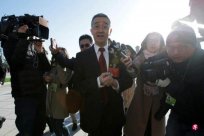The European modern diplomatic website published on October 14th that the conflict between Israel and Hamas was published: echoed articles in global geopolitics, the author is Berhay Benjamin.The full text is as follows:
The fierce conflict between Hamas and Israel once again attracted the attention of the world.The "Aksa Flood" operation indicates the deeply rooted hostility and strategic considerations at the moment, and clearly reminds people's turbulence characteristics of geopolitical in the Middle East.
The US intervention in the Middle East, especially during the "Aksa flood" operation, can be identified through strategic deterrent prisms.Washington adopted subtle tactics, combined with military attitude and diplomatic operations, trying to affect the ending of the situation without promising military contact.
The military posture is obvious, but the diplomatic balance operation of Biden's government cannot be ignored.He issued information that supports Israel, but warned not to take over fire, which highlighted a delicate balance.The United States does this to make its strategic allies feel abandoned while limiting the scale of conflict.
The core background of the "Aksa Flood" operation is a subtle change in relations between the United States and Iran. Especially considering that Iran's previous asset thawing in South Korea, this adds a complexity to the geographical political pattern.
The humanitarian nature of these assets quickly emphasizes the nature of these assets, claiming that they are specified in specific fields such as medicine and food.The United States has a double purpose: First, it aims to alleviate the concerns of the outside world's possibility of conflict between these assets and refute that the asset thawing and the growth of hostile entities have been rejected. Moreover, the United States tries to conduct funds around Iran in the Middle East.Narrative control, hoping to restrain Tehran in this intricate geopolitical game, maintain a certain balance.
In essence, the approach adopted by the United States is to curb and carefully plan contact.On the one hand, Washington must ensure its own interests, and on the other hand, we hope that it will not be dragged into another protracted Middle East conflict to achieve a balance -not only reiterate the regional dominant position, but also prevent potential upgrades.
The position adopted by China in the "Aksa flood" operation marks its role that has evolved on the global stage.The way China responds to the Middle East crisis gives people the opportunity to insight into their diplomatic scripts and strategic priorities.
The position adopted by China comes from the historical recognition of the Palestinian career.As early as 1988, China acknowledged Palestine and often defended the Palestinian rights on the international stage.However, China's position is not only related to history, but also reflects more geopolitical ambitions, that is, seeking a balance with Arab countries and Israel.
The response to this crisis shows that China is committed to principle diplomacy.Beijing urges both parties to maintain restraint and emphasize the importance of dialogue, and support peacetime rather than military upgrades.This approach is in line with China's long -term "non -interference" diplomatic principles, highlighting that China hopes to solve disputes through dialogue instead of force in a multi -pole world.
There are rich resources and multiple strategies in the Middle East, which is very important to China, especially under the background of the “Belt and Road” initiative.Ensuring the stability of the Middle East is essential for China's long -term economic and strategic interests.By adopting a balanced position, China aims to promote the relationship with both parties and ensure that it is still a key participant in the region's evolution.
China's way of responding to the "Aksa Flood" action crisis cannot be separated from its wider global force relationship, especially the competition between China and the West and the United States.By adopting a position different from the United States and its allies, China cleverly challenges the hegemony of Western in international relations and positions itself as the pole of global geopolitics.
China's rapid development of economy needs to establish a strong economic partnership worldwide.In the Middle East, China has a lot of investment and trade relations.China's balance stance also shows that China wants to protect these economic interests and ensure that bilateral trade and investment are not affected by regional conflicts.
In the complex matrix of the geopolitical in the Middle East, the Allah is a pivotal role and exerts a significant influence.The "Aksa Flood" operation provides a brand new background to evaluate the strategic considerations of the Lord, revealing the principles of restraining its careful planning.
Although the core ideology of the Allah is quite consistent with the Palestinian resistance, the restraint decision made by the organization shows that it has a deeper understanding of the dynamics of the current area.The restraint of Allah is not a weak manifestation, but reflects its keen interpretation of the geopolitical pattern.
The domestic considerations in Lebanon have greatly affected the widespread strategic choice of the Allah.Given that Lebanon's current political vacuum and economic fragility, any offensive position adopted by the Allah may exacerbate the internal challenges facing Lebanon.The organization is keenly aware that directly confronting Israel with Israel may shake its position in Lebanon, thereby destroying its long -term goals.(Compilation/Zhao Feifei)


